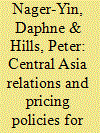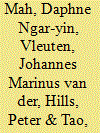| Srl | Item |
| 1 |
ID:
085511


|
|
|
|
|
| Publication |
2008.
|
| Summary/Abstract |
Renewable energy, although capable of making a significant contribution to the achievement of sustainable development, has, however, failed to reach its full potential in mist countries. A major challenge of the sustainability tradition is how to translate sustainable development from a concept to effective implementation. However, the mechanisms through which the concept of sustainable development can be into operation remain an area largely unexplored in the energy
|
|
|
|
|
|
|
|
|
|
|
|
|
|
|
|
| 2 |
ID:
115647


|
|
|
|
|
| Publication |
2012.
|
| Summary/Abstract |
Consumers have a major role to play in smart grid technologies which can be instrumental in addressing climate change and energy challenges. However, little is known about how consumers perceive, and how they might respond to the opportunities that smart grid technologies offer. This paper reports the results from a Hong Kong survey (n=505). It contributes to the literature by providing a better understanding of the perceptions and behaviour of electricity consumers about the possible deployment of smart grids.
Our results indicate that Hong Kong consumers generally welcomed smart grid technologies and had a preference for energy saving, energy efficiency and renewable energy while they showed a high level of opposition to nuclear power. They displayed an interest in playing a much more informed and active role in energy decision-making, but they were sensitive to tariff increases. Motivations and barriers for consumers to support smart grid developments are also discussed. We conclude with a discussion of policy implications for effective consumer engagement. More policy attention is needed on demand-side measures, introducing institutional and regulatory changes, and modifying relationships between consumers, the government and utilities.
|
|
|
|
|
|
|
|
|
|
|
|
|
|
|
|